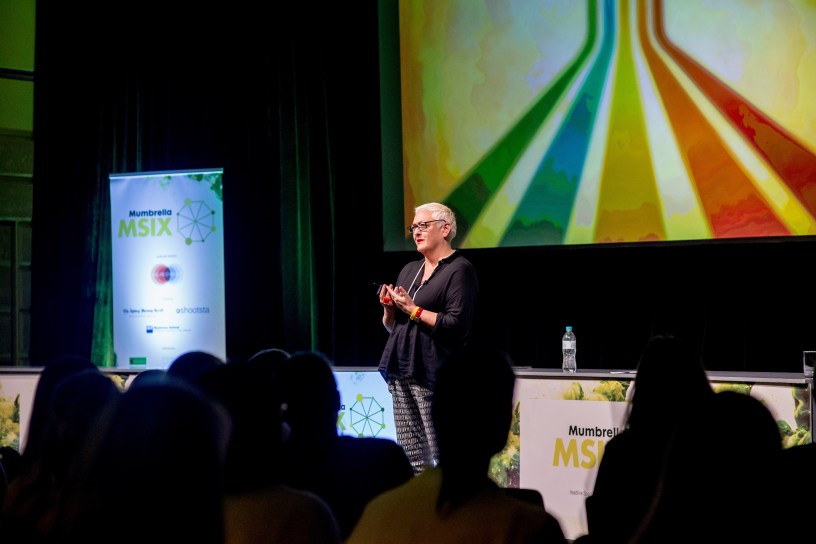Deb Verhoeven at the Mumbrella MSIX conference (photo credit: Mumbrella).
Screen Australia’s Gender Matters initiative is not tackling the male dominance of the film production industry, according to Professor Deb Verhoeven, who proposes a radical solution: deny funding to men who don’t employ women in their creative teams.
Associate dean (engagement and innovation) in the faculty of arts and social sciences at the University of Technology Sydney, Verhoeven told IF: “The closed networks of men in the film industry do not benefit Australian society.
“We need to make some attempt to change that behaviour by no longer funding men with no track record for diverse employment on creative teams.
“I believe we should aim to change the values of the industry – for equity. And then those creatives who don’t ascribe to these values should be assessed as ineligible for funding.”
Verhoeven was amplifying on her speech at last week’s Mumbrella SMIX conference, in which she argued the screen industry puts too much emphasis on data about women and doesn’t focus enough on what men are doing to “prop up the patriarchy.”
Releasing annual statistics on the relative lack of women in the film industry is not helpful, and the situation overall has not improved in 30 years, she believes.
She proposes a two-step strategy, firstly to collect data on men, who have the highest interest in maintaining the status quo, and secondly, rather than focus on the total number of men in the industry, look at how and with whom they network.
“By examining the ways in which gatekeeping operates in the industry we can identify both the structural patterns of injustice and the individual people who deliver them,” she said.
“This new approach to examining power in the film industry can help us rethink our assumptions about how to produce social change because it reveals how certain values (e.g. men are a less risky investment) move between agencies and organisations and the individual decision makers and by focusing on actual behaviours and not proportional statistics.”
“We potentially could adopt an approach in which there would no longer be a need to wait until women are traumatised before we admit that an injustice exists. So women and other minorities would no longer need to prove evidence of the discriminations perpetrated against them only after they have occurred.”
Speaking at MIFF 37°South, Screen Australia COO Fiona Cameron revealed that 47 per cent of production funding approvals had female-led creative teams averaged across 2015-16 and 2016-17.
Announced in December 2015, Gender Matters’ goal is to see 50 per of projects to receive production funding by 2018-19 be female-led.
Cameron noted successful applications for female-led feature films jumped to 39 per cent in 2016-17 from a low of 22 per cent in 2015-16. Documentary was also inching towards parity, with 42 per cent of production funding going to projects from female-led teams across the last two financial years.
However the number of women working in the feature film industry over the five years to 2016-17 remains low, with females accounting for just 34 per cent of producers, 15 per cent of directors and 22 per cent of writers.
Verhoeven quotes an analysis of Screen Australia data by her former Deakin University colleague Amanda Coles which, she said, showed female representation in feature films has actually declined.
In 2014-15, 15 films had male directors and five had female directors. In 2015-16 there were 20 directed by men, four by women and one with a mixed-gender team.
In 2016-17 up to September 5, there were 12 films with male directors and only two with female directors.
Verhoeven concluded: “In a largely government supported industry Screen Australia has a mandate to produce films which reflect the diversity of Australian culture. This needs to be taken seriously and applied.
“We need to address the blockages. We don’t need more schemes to build women’s confidence.
“To fix exclusion you need to focus on the people doing the excluding. Not the people affected by it.”
Screen Australia declined to respond to Verhoeven’s comments.



